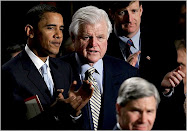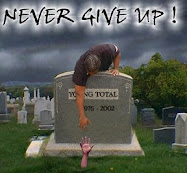Wednesday, August 19, 2015
Bernie Sanders
The struggle to create a nation and world of economic and social justice and environmental sanity is not an easy one. The struggle to try and create a more peaceful world will be extremely difficult. But this I know. Despair is not an option if we care about our kids and grandchildren. Giving up is not an option if we want to prevent irreparable harm to our planet.
We must stand up and fight back. We must launch a political revolution which engages millions of Americans from all walks of life in the struggle for real change. This country belongs to all of us, not just the billionaire class. And that’s what this campaign is all about.
Bernie Sanders: The Vox conversation
From Wikipedia
Bernard "Bernie" Sanders (born September 8, 1941) is the junior United States Senator from Vermont and a candidate for the Democratic Party's nomination for President in the 2016 U.S. presidential election.
Sanders is the longest-serving independent in U.S. congressional history. A self-described democratic socialist, he favors policies similar to those of social democratic parties in Europe, particularly those of Scandinavia. He caucuses with the Democratic Party and has been the ranking minority member on the Senate Budget Committee since January 2015.
Born in Brooklyn, New York, Sanders attended Brooklyn College before transferring to and graduating from the University of Chicago, where he was a member of the Young People's Socialist League, and active in the Civil Rights Movement as a student protest organizer for the Congress of Racial Equality and the Student Nonviolent Coordinating Committee. In 1963, he participated in the March on Washington for Jobs and Freedom.
Sanders settled in Vermont in 1968, and ran unsuccessfully for Governor and U.S. Senator in the early to mid-1970s as a member of the Liberty Union Party. As an independent supported by the Vermont Progressive Party, Sanders was elected mayor of Burlington, Vermont's most populous city, in 1981. He was reelected to three more two-year mayoral terms before being elected to represent Vermont's at-large congressional district in the United States House of Representatives in 1990. He served as a congressman for 16 years before being elected to succeed the retiring Republican-turned-independent Jim Jeffords in the U.S. Senate in 2006. In 2012, he was reelected by a large margin, capturing almost 71% of the popular vote.
Since his election to the Senate, Sanders has emerged as a leading progressive voice on issues like income inequality, universal healthcare, parental leave, climate change, LGBT rights, and campaign finance reform. He rose to national prominence on the heels of his 2010 filibuster of the proposed extension of the Bush-era tax rates for the wealthy. Sanders is also outspoken on civil liberties, and has been particularly critical of mass surveillance policies such as the Patriot Act, along with racial discrimination in the criminal justice system.
Bernie Sanders Portland Rally with Crowd of 20,000
Friday, April 24, 2015
Dr. Cornel West Speaks in Arizona
Cornel Ronald West (born June 2, 1953) is an American philosopher, academic, activist, author, public intellectual, and prominent member of the Democratic Socialists of America. The son of a Baptist minister, West received his undergraduate education at Harvard University, graduating with a bachelor's degree in 1973, and received a Ph.D at Princeton University in 1980, becoming the first African American to graduate from Princeton with a Ph.D in philosophy. He taught at Harvard in 2001 before leaving the school after a highly publicized dispute with then-president Lawrence Summers. He was The Class of 1943 Professor of African American Studies at Princeton before leaving the school in 2011 to become Professor of Philosophy and Christian Practice at the Union Theological Seminary in New York City. He has also spent time teaching at the University of Paris.
From Wikipedia
Saturday, February 14, 2015
Tuesday, January 6, 2015
How 13 Complaints Against McDonald's Could Help Millions Unionize
How 13 Complaints Against McDonald's Could Help Millions Unionize
DAVID MOBERG 0SC ON JANUARY 06, 2015 NationofChange
The law is catching up with Ronald McDonald. On Friday, the National Labor Relations Board issued 13 complaintsinvolving 78 charges by workers that McDonald’s USA, LLC, and many of its franchisees broke the law by interfering with collective efforts to organize and improve working conditions.
The complaints will now go to trial before administrative law judges , who could, for the first time, find McDonald’s guilty of violating workers’ right to organize. Until now, McDonald’s has shielded itself from liability by claiming that it’s not an actual employer. Franchisors argue that although they provide the brand name, products, techniques and other operational necessities, they leave franchisees the discretion to operate as sole employer, responsible for all labor costs, risks and obligations.
What’s so significant about the NLRB’s complaints is that the board defines McDonald’s as a joint employer with its franchisees—and thus sharing responsibility.
That marks a huge victory for the Service Employees International Union (SEIU ), which for two years has funded and helped organize a campaign by fast-food and other retail workers to win $15 an hour and the right to unionize—a movement often known as the Fight for 15, though it has different names in different cities. SEIU helped workers file 291 charges that McDonald’s and franchisees retaliated against workers for participating in Fight for 15 strikes and protests. On Friday the board announced it had found merit in 86 charges that McDonald’s had discriminated against workers engaged in collective action by disciplining them, reducing their hours, discharging them unfairly, threatening them, placing them under surveillance and interrogating them. NLRB investigators resolved a few of the case this fall, filed complaints about 78 of the meritorious charges, and are still looking into 71 more.
It was long unclear whether the SEIU’s investment in Fight for 15 would allow it to formally unionize the sector, whose division into thousands of franchises made organizing a Herculean task. As the New York Times’ Steven Greenhouse wrote in July, when the NLRB general counsel first indicated that it was moving in the direction of declaring McDonald’s a joint employer, the definition “open[s] the door for the SEIU to try to unionize not just three or five McDonald’s at a time, but dozens and perhaps hundreds.”
In total, the joint employer definition could ease the way to unionization for more than 8 million workers in the franchise workforce.
Subscribe to:
Posts (Atom)































